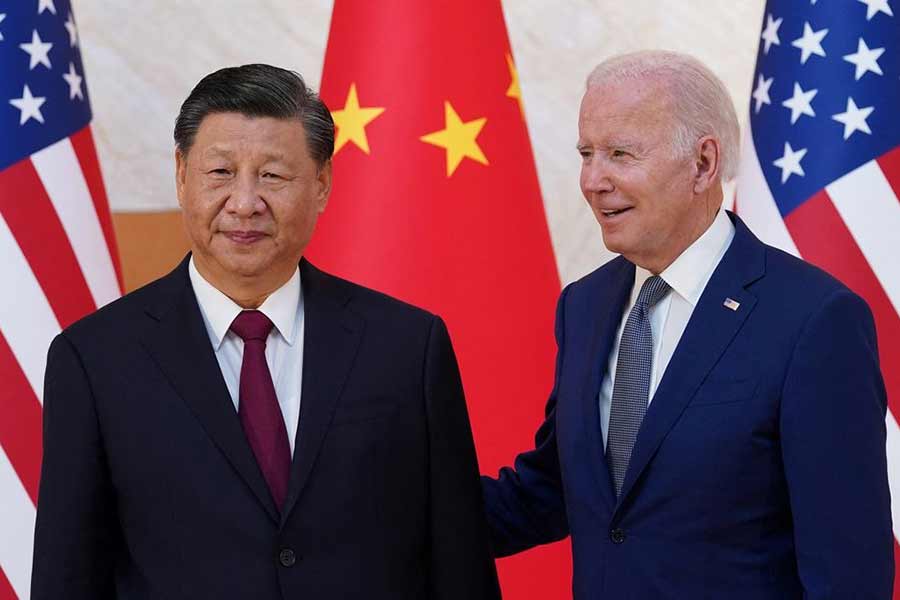
Published :
Updated :

US President Joe Biden meets Chinese leader Xi Jinping for the first time in a year on Wednesday, for talks that may ease friction between the adversarial superpowers on military conflicts, drug-trafficking and artificial intelligence.
However, deep progress on the vast differences separating the world's economic superpowers may have to wait for another day, reports Reuters.
Officials on both sides of the Pacific have set expectations low as Biden and Xi are set to discuss Taiwan, the South China Sea, the Israel-Hamas war, Russia's invasion of Ukraine, North Korea, and human rights, each of them areas where the leaders have been unable to resolve long disagreements.
Biden and Xi arrived in San Francisco on Tuesday, where they were set to hold their meeting on the sidelines of the Asia-Pacific Economic Cooperation (APEC) summit.
Leaders from the 21-member country group - and hundreds of CEOs in San Francisco to court them - meet amid Chinese economic weakness, Beijing's simmering territorial feuds with neighbours and a Middle East conflict that is dividing the United States from allies.
Efforts to carefully choreograph Xi's visit may be upended in the restive Northern California city, despite efforts to drive homeless people from the streets. The route from the airport to the conference site was lined with demonstrators for and against China's ruling Communist Party, an unusual sight for Xi who last visited the United States in 2017.
Biden has sought direct diplomacy with Xi, betting that a personal relationship he has cultivated for a dozen years with the most powerful Chinese leader since Mao Zedong might salvage bilateral ties that are increasingly turning hostile.
Xi and Biden are expected to meet far from the conference location at a vast estate miles outside of San Francisco carefully chosen for its security, serenity and remoteness.
"The table has been set ... over the course of many weeks for what we hope will be a very productive, candid, constructive conversation," said John Kirby, a White House spokesperson, to reporters travelling aboard Air Force One.
IRAN, ELECTION INTERFERENCE
During the meeting, which could last hours, Biden is expected to press Xi to use China's influence to urge Iran not to take provocative action or encourage its proxies to enter the fray, to avoid regional escalation of the Israel-Hamas conflict.
He is also expected to raise Chinese "influence operations" in foreign elections and the status of US citizens that Washington believes are wrongly detained in China.
US officials expected concrete steps to restore staff-level conversations between the two countries on specific issues from military-to-military communications to reducing the flow of fentanyl, managing the growth of artificial intelligence technologies, managing trade and climate. Many of the chemicals used to make fentanyl come from China, US officials say.
Biden, 80, presides over an economy that has outperformed expectations and most rich nations after the COVID-19 pandemic. Unpopular with voters at home, he is seeking a second term in office amid concerns about the stability of US democracy.
He has corralled the nation's traditional allies from Europe to Asia to confront Russia in Ukraine, although some have differences over the Israel-Hamas conflict.
Xi, a decade Biden's junior, has tightened control over policy, state leaders, the media and military and changing the constitution. Recently, compounding economic challenges have thrown the country off its three-decade, rocket-propelled growth trajectory.
Government officials across the region expect Beijing to test Washington in coming weeks, taking advantage of the United States' perceived shift in focus on Ukraine and Israel, as it pursues its own ambitions in the Indo-Pacific.
Biden is expected to tell Xi that US commitments in the Indo-Pacific are unchanged. China has worried its neighbours in recent years with steps in the Taiwan Strait, South China Sea and East China Sea, areas of international dispute. Biden will also express a specific commitment to the security of the Philippines, one of the US officials said.


 For all latest news, follow The Financial Express Google News channel.
For all latest news, follow The Financial Express Google News channel.